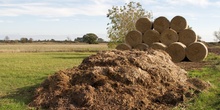Agriculture & Land Management
Our Work
Latest in Bioenergy
-

Ensuring the carbon sustainability of biomass
Ensuring the carbon sustainability of bioenergy requires a new approach in EU policy. This IEEP report spells out a different pathway to the one proposed by the European Commission in the recently released “winter package”.
-
Moving the debate on sustainable bioenergy to 2030
On 30th November, the European Commission published a “Winter package” of policy proposals, including for bioenergy in the form of a revised Renewable Energy Directive. Although encouraging to answer the many requests for policy certainty, a number of key questions about the right and most appropriate approach to deliver sustainable bioenergy still remain and need further scrutiny.
-
Understanding the consequences of changing biomass demand for energy
Understanding the consequences of increased biomass demand for energy on the environment is central to the development of future policy on renewable energy in Europe. This study seeks to help answer this need by modelling different levels of biomass demand for energy and the consequences for land use and forest based industries.
-
The cascading use of woody biomass in the EU – challenges, opportunities and policy solutions
Improving the resource efficient use of wood through cascading the resource from one use to another, requires action throughout the wood flow. Current efforts focus on recovering and re-using waste wood but more could be done with the production and utilisation of wood processing residues and improving the balancing between the material and energy use of wood.
-
IEEP sets out new sustainability criteria for biofuels post 2020
Defining effective and workable sustainability criteria for biofuels is one of the critical steps in decarbonising Europe’s energy sector. Such criteria must provide the necessary safeguards for the use of bioresources in Europe, as well as the policy and investment certainty required for sustainable deployment.
-
Sustainability criteria for biofuels post 2020
Defining effective and workable sustainability criteria is one of the critical steps in decarbonising Europe’s energy sector. They must provide the necessary safeguards for the use of bioresources in Europe, as well as the policy and investment certainty required for sustainable deployment.
-
Mapping study on the cascading use of wood products
Promoting the cascading use of wood through policy is one approach to improve resource efficiency and increase the overall availability of wood for use in a variety of sectors.
-
Land suitability assessments for bioenergy feedstocks in the EU – a review of data sources
Current data availability is inadequate to undertake a detailed national or European level study of land areas that are underutilised and could be considered available for bioenergy production within the EU.
-
New report launch: Call for a new vision for responsible renewable energy with a clear European dimension
Claude Turmes MEP hosted an event launching both IEEP’s report and a debate on the future of renewable energy in Europe. In the our report IEEP present how a resource efficient energy system might be delivered in a way that minimises impact on biodiversity and the wider environment.
-
Assessing sustainable biomass availability
Dr. Ben Allen presented IEEP’s views on the sustainable use of biomass at an international conference in Brussels. Understanding the scale of the resource is a key part of determining appropriate policy intervention and ensuring commercial viability.
-
New report: delivering low carbon transport fuels post 2020
How should EU policy support the transition to low carbon transport fuels post 2020? A new IEEP led report argues that future policies should be differentiated to tailor support towards specific objectives and technologies that offer the greatest potential for a low carbon future.
-
New report is out: delivering low carbon transport fuels post 2020
How should EU policy support the transition to low carbon transport fuels post 2020? A new IEEP led report argues that future policies should be differentiated to tailor support towards specific objectives and technologies that offer the greatest potential for a low carbon future.
-
Conclusion on ILUC in sight
After five years of discussion, a landmark moment has been reached whereby the indirect land use change (ILUC) impacts of biofuels almost certainly will be addressed in EU law.
-
Space for energy crops – An assessment on the potential contribution of Europe’s energy future
The overall energy potential that can be produced from growing dedicated energy crops on ‘spare’ land in the EU is low. This new report explores the potential for the additional production of energy crops in Europe on land not already used for food production, forestry, or providing other important services, and assesses some of the challenges associated with increasing output.
-
Press release - Biofuels don’t deliver but bioresources have promise
Biofuels produced from conventional agricultural crops deliver only limited reductions in greenhouse gas emissions (GHG) and compete for limited supplies of land.
-
Ministers place biofuels in a policy vacuum
Energy Ministers today failed to agree reforms to the EU laws that promote the use of biofuels for transport. Current EU legislation is flawed and unfit for the purpose of delivering verifiable greenhouse gas emission reductions from the transport sector.
-
Shifting away from conventional biofuels
The UK has ample potential to use wastes and residues for advanced biofuels and create jobs in this emerging industry – but safeguards are key to ensure this is done in an environmentally sustainable way.
-
The sustainability of advanced biofuels in the EU
Using wastes and residues for biofuels has many advantages. But ensuring sustainability and including safeguards in EU legislation are critical issues.
-
Alternative means of reducing CO2 emissions from UK road transport
Up to 2020 greater use of renewable electricity is the leading alternative to biofuels to reduce the carbon intensity of car and rail transport fuels. To realise this potential requires a mix of responses, including: increasing the decarbonisation of existing transport fuels; improving the energy efficiency of vehicles; and changing the way vehicles are used.
-
Addressing ILUC? The European Commission’s proposal on indirect land use change
The European Commission’s proposal on indirect land use change – what’s in it for mitigating emissions? Read IEEP’s latest Biofuel ExChange briefing.
Related
-

Developing a sustainable future for biofuels
Disseminating knowledge and informing the debate around the future of biofuel policy in the EU.
Highlights
-

Ensuring the carbon sustainability of biomass
Ensuring the carbon sustainability of bioenergy requires a new approach in EU policy. This IEEP report spells out a different pathway to the one proposed by the European Commission in the recently released “winter package”.
-

Understanding the consequences of changing biomass demand for energy
Understanding the consequences of increased biomass demand for energy on the environment is central to the development of future policy on renewable energy in Europe. This study seeks to help answer this need by modelling different levels of biomass demand for energy and the consequences for land use and forest based industries.
-

The cascading use of woody biomass in the EU – challenges, opportunities and policy solutions
-

Sustainability criteria for biofuels post 2020
-

Land suitability assessments for bioenergy feedstocks in the EU – a review of data sources
-

New report: delivering low carbon transport fuels post 2020
-

Biofuels and Agricultural Commodity Prices: A Review of the Evidence Base
-

Mobilising Cereal Straw in the EU to Feed Advanced Biofuel Production
